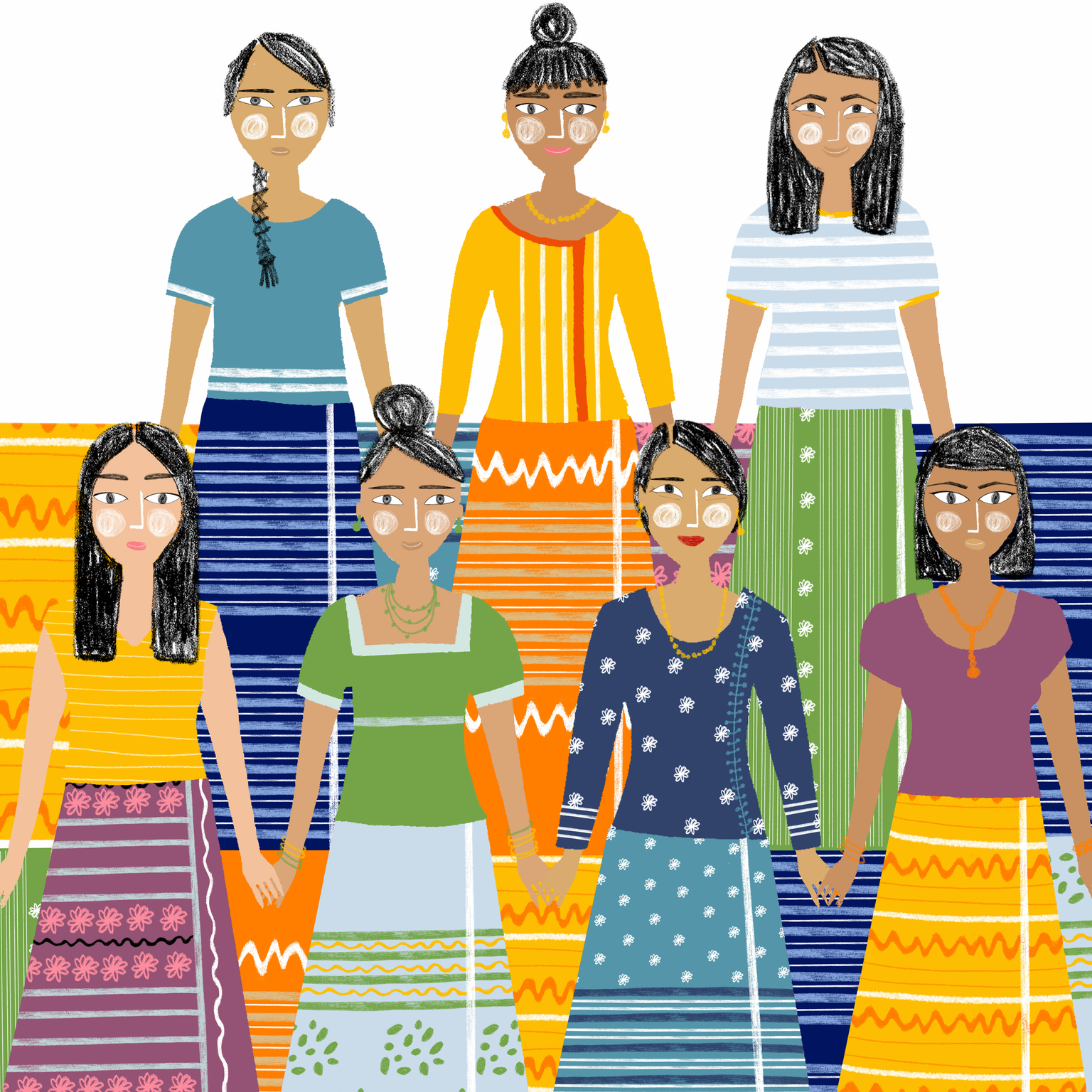Myanmar is a changing place, a country tentatively opening itself up to the rest of the world. The military has stepped back from its total control of the government, after a half-century of rule that sanctioned the murder and rape of opponents and minority groups. (1), the Nobel Prize–winning activist — known simply as “The Lady” in Myanmar — is now the state counselor, a role akin to prime minister. It was unthinkable ten years ago, but the government is starting peace talks with opposition groups and sent a solicitous delegation to hear out Myanmar women’s concerns at the UN’s Committee on the Elimination of Discrimination Against Women.
Shifts in the culture, however, can be slower. In Myanmar, women still deal with the stigma that their bodies are dirty, with periods being especially taboo. Sex education is considered a Western practice, but one social activist and her organization are trying to change how women think of their bodies and empower them to take on traditionally male jobs.
> In Myanmar, women still deal with the stigma that their bodies are dirty, with periods being especially taboo.
In 2008, Daw Htar Htar had a chance meeting with an Israeli tourist who was a sex therapist. She was 35 and a mother of a nine-month-old, but Htar realized how little she knew about her own body.
“That was a turning point of my whole life,” she said.
In 2010 she started (2), an organization that offers sex-education workshops where women can talk with one another about their bodies and sex. In the workshops, women are told they aren’t second-class citizens and are encouraged to feel proud of their bodies.
“We tell them, ‘You’re valuable, you’re not dirty, you’re not low,'” she said.
Akhaya has a lot of work to do. Women aren’t taught about their bodies or sexuality in school or at home. There isn’t even a word for “vagina” in the Burmese language, one of the most common languages in Myanmar (they use a word that means “women’s body” when referring to it). Women keep their sarongs and underwear separate from men’s clothing when doing the wash and hang them on lower lines. There’s a whole industry surrounding this idea that women are dirty. There are ads around the country for a product called Kathy Pan, which supposedly cleans vaginas. Some women have tried to use Kathy Pan to end pregnancies since abortions are generally illegal in Myanmar.
> Women aren’t taught about their bodies or sexuality in school or at home.
“There are a lot of myths and prejudices around sex and sexuality,” Htar said.
The workshops, run over four days, cover a lot of territory, with attendees ranging from fourteen-year-old girls to menopausal Buddhist nuns. Women are sent home with mirrors so they can look at their vaginas. Htar said many women did not know what that part of their body looked like.
“I think a few look,” she said with a laugh.
Akhaya is part of a blossoming of women’s groups that sprung up after the end of military rule in 2011. There are at least 170 organizations working on getting more women elected so they can prioritize ending domestic violence.
“We have a very vital and active women’s-rights movement in Myanmar now,” said Jo Hayter, the chief executive officer of International Women’s Development Agency.
For Htar, the next step after teaching women their worth was to put equality in practice while taking into consideration what is considered taboo. She started SHE-smiths to train women in the craft of silversmithing, a job until recently done only by men. Smiths, who often handle gems that are used in jewelry that carry religious significance for the wearer, haven’t been women because they are viewed as unclean and unworthy to touch those gems when they are on their periods.
> For Htar, the next step after teaching women their worth was to put equality in practice while taking into consideration what is considered taboo.
One such piece is the nawarat, which is a ring or pendant set with nine gems: a diamond, pearl, cat’s eye, zircon, emerald, topaz, blue sapphire, coral, and ruby. Some people believe the nawarat brings fortune and power to the wearer, and there are many rules surrounding how and when the gems are selected and set. The SHE-smith trainees are learning to do it all.
The inaugural class of three women started in May; they will graduate at the end of the year.
One of the trainees, Betty Millar, had already done the workshop at Akhaya and was eager to join the silversmith program. Millar, 30, said she hopes to stay on as a trainer after she graduates. Her family supports her, but that hasn’t always been the case in SHE-smith’s short existence. Another trainee had to leave when she wasn’t able to balance the program with the chores she was expected to fulfill at home.
“This is one of the key challenges for women,” said Anne Kennedy, Akhaya’s social business mentor. “Actually doing something for themselves outside the traditional role and outside the family at home.”
SHE-smith is the latest effort by Htar to improve women’s roles in Myanmar. Htar said that societal change will come when women are empowered, whether through job training or learning that they are not dirty.
“After learning their worth,” Htar said, “women are brave. They talk differently.”
*Jackie Snow is a multimedia journalist based in D.C. with dreams to visit Myanmar again ASAP.*
1) (http://link.lennyletter.com/click/7917545.12/aHR0cDovL3d3dy5iYmMuY29tL25ld3Mvd29ybGQtYXNpYS1wYWNpZmljLTExNjg1OTc3P3NyYz1ubCZtYWc9TEVOJmxpc3Q9bmxfTEVOX25ld3MmZGF0ZT0xMDAxMTY/5672eded1aa312a87f2d6890Bb6ced87f)
2) (http://link.lennyletter.com/click/7917545.12/aHR0cDovL2FraGF5YS5vcmc_c3JjPW5sJm1hZz1MRU4mbGlzdD1ubF9MRU5fbmV3cyZkYXRlPTEwMDExNg/5672eded1aa312a87f2d6890Bfa4198b4)



